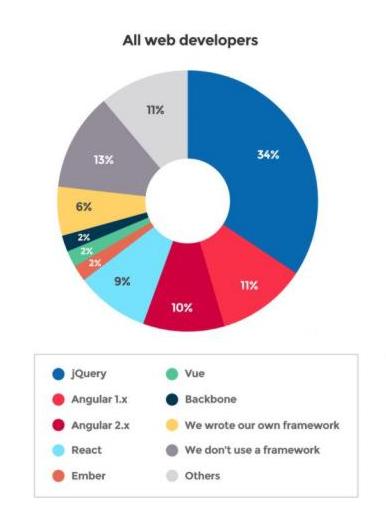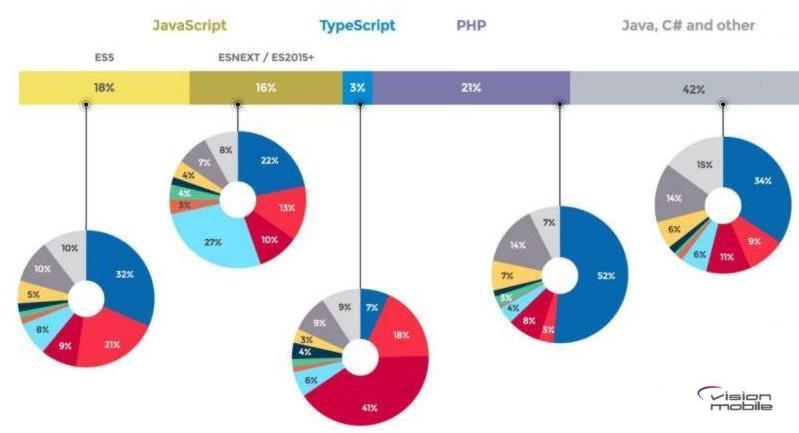| jQuery Still Our Favourite Framework |
| Written by Ian Elliot |
| Wednesday, 12 April 2017 |
|
Although Angular and React are the JavaScript frameworks that tend to grab most attention, jQuery is still the predominant choice, especially so for programmers using PHP on the server.
I've extracted the charts below from the results of Vision Mobile's most recent developer survey which were published this month in Developer Economics: State of the Developer Nation Q1 2017. The authors of the report used these results, based on the responses of 5,883 web developers, to comment on Angular and React. Their stance is: In web development, The Angular and React Javascript frameworks, built by two of the most powerful companies on earth, are fighting for world (or should we say ‘web’?) domination. The current winner might surprise you! Personally I'm not surprised that jQuery comes out in front but let's hear what Vision Mobile has to say: Historically jQuery was the first library to get really popular, enabling easier manipulation of the DOM on the client side. It’s still the most popular today, as the primary front-end library for 34% of web developers. However, manually manipulating the DOM turns out to be extremely complex and error-prone when it’s happening extensively, so frameworks that provide a better abstraction are increasingly important. Overall just 12% of web developers don’t use any kind of framework and another 6% have written their own. That leaves 48% of web developers currently using a third-party framework other than jQuery as their primary way of doing front-end web development. Of those, Angular and React account for 30% of all usage, leaving all the others far behind. Indeed front-end web development is such a fragmented space that no other single library or framework accounts for more than 2% of primary usage. So React and Angular certainly lead other frameworks, although only around half of all web developers have fully embraced any single page application framework so far. I'm surprised by the proportion of respondents still not using a framework at all and by the substantial number that claim to have written their own. Other interesting takeaways from this chart include Angular usage being fairly evenly split between Angular 1 and 2 and the fact that Ember, Vue and Backbone only have 2% share each. Vision Mobile provides a further analysis by primary language which is very revealing:
Among TypeScript users jQuery has become marginalized while Angular 2 dominates - but Type Script is only the primary language for 3% of web developers. JavaScript is the primary language for 34% and is subdivided into two and jQuery is used by almost a third of those sticking with the older versions but less than a quarter of those who have moved on to more up-to-date once, where it comes in third place after React (27%) and Angular (25%). Vision Mobile's overview of the history of Angular and React tends to explain the distributions: AngularJS (Angular 1.x) was the first single page app framework to get the stamp of approval from an internet giant, when Google started to back the open-source side project of one of their employees publicly. Google’s backing gave many large enterprises the confidence to adopt, and with broader adoption came a flourishing ecosystem of components and tools. As this was happening, React was built internally at Facebook and deployed on the Facebook newsfeed in 2011 and then Instagram’s web app in 2012. Yet React wasn’t released as open source until 2013, by which time Angular had an enormous lead in both adoption and ecosystem. Then in late 2014 Google appeared to stumble previewing Angular 2.0, which was going to be incompatible with Angular 1.x and use a new language. Reaction from the developer community was not good. By mid-2015 Google had agreed to work with Microsoft so that TypeScript became the official language for Angular 2.0, while the 1.x series had a promise of continued support, and a migration path between versions was created. This discontinuity for the Angular community seemed like a gift to the already rapidly growing React.
Over half PHP developers favor jQuery and it is among PHP developers that a custom framework is most popular, as is not using a framework. Again Vision Mobile's insights provide a convincing explanation: Given the focus on rendering pages serverside in most of the popular PHP content management systems, it’s not too surprising to find less interest in single page app frameworks in general amongst these developers, with 52% still using jQuery as their primary library. Interestingly only 3% of PHP developers are primarily using Angular 1.x, with 8% on Angular 2.x, and just 4% for React. In fact almost as many PHP developers don’t use any library or framework for the front-end (14%) as use React plus either Angular version. Developers primarily using server-side languages other than JavaScript/Node.js or PHP (totalling 42% of all web developers) are significantly less likely to be using jQuery than PHP developers but they are also significantly less interested in Angular and React than the JavaScript developers (26% vs 38%). When they do primarily use one of these front-end frameworks, far more choose Angular (20%) than React (6%), and more of the Angular users are on version 2.x (11%) than version 1.x (9%). Among the web developers whose primary language is Java, C# or some other server-side language jQuery is the preferred framework for over a third, exceeding the share alloted to Anglar and React combined. So all it all it still reigns as JavaScript's standard library.
More InformationDeveloper Economics: State of the Developer Nation Q1 2017 Related ArticlesTake VisionMobile's Gamified Developer Survey Vision Mobile Reveals Latest Developer Landscape jQuery 3.2.1 Is Out - Do We Still Care? jQuery 3 - Understanding jQuery Getting Started with jQuery UI Just jQuery: The Core UI (I/O Press) To be informed about new articles on I Programmer, sign up for our weekly newsletter, subscribe to the RSS feed and follow us on Twitter, Facebook or Linkedin.
Comments
or email your comment to: comments@i-programmer.info <ASIN:1871962501> <ASIN:1871962528> |
| Last Updated ( Monday, 03 September 2018 ) |




